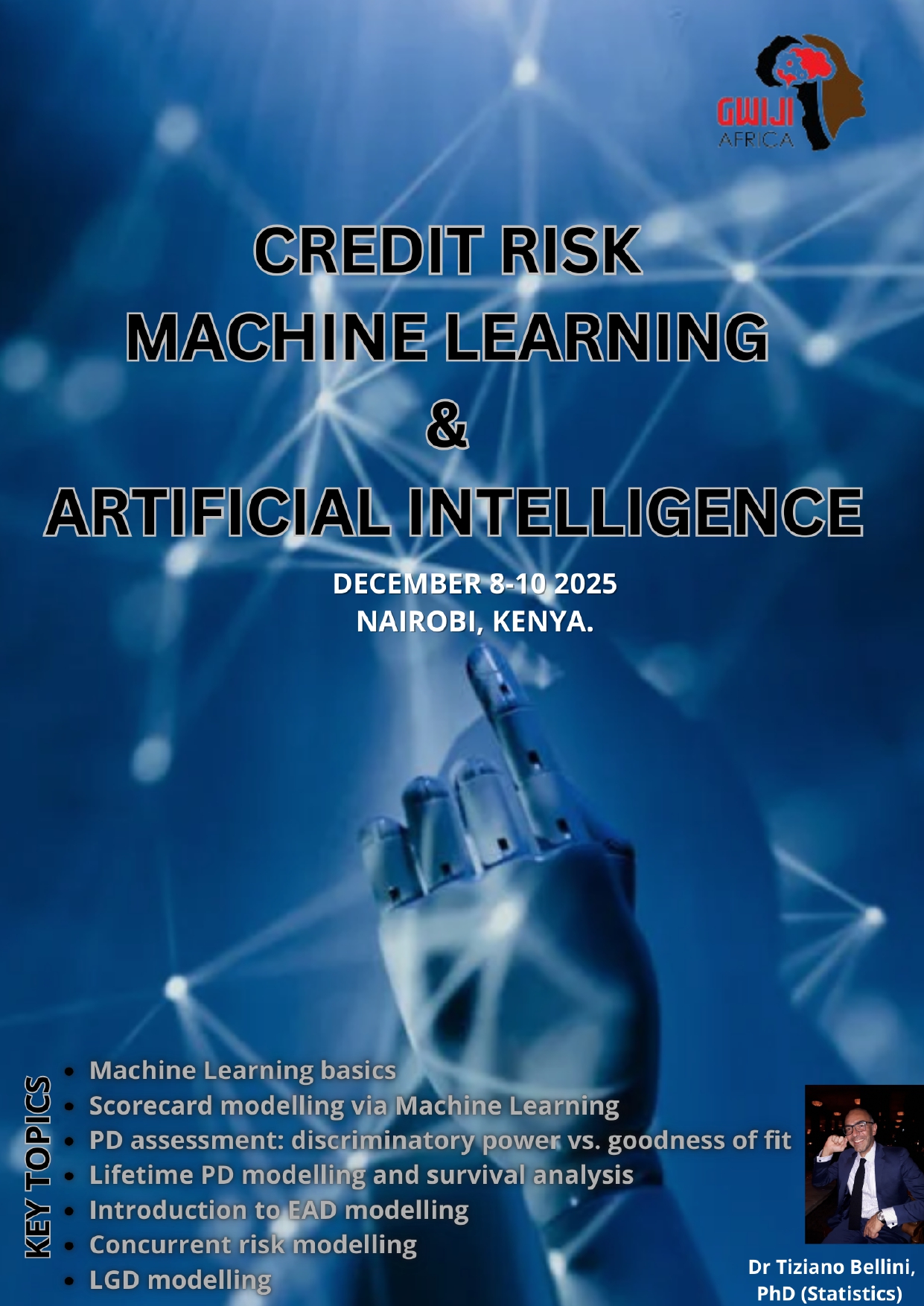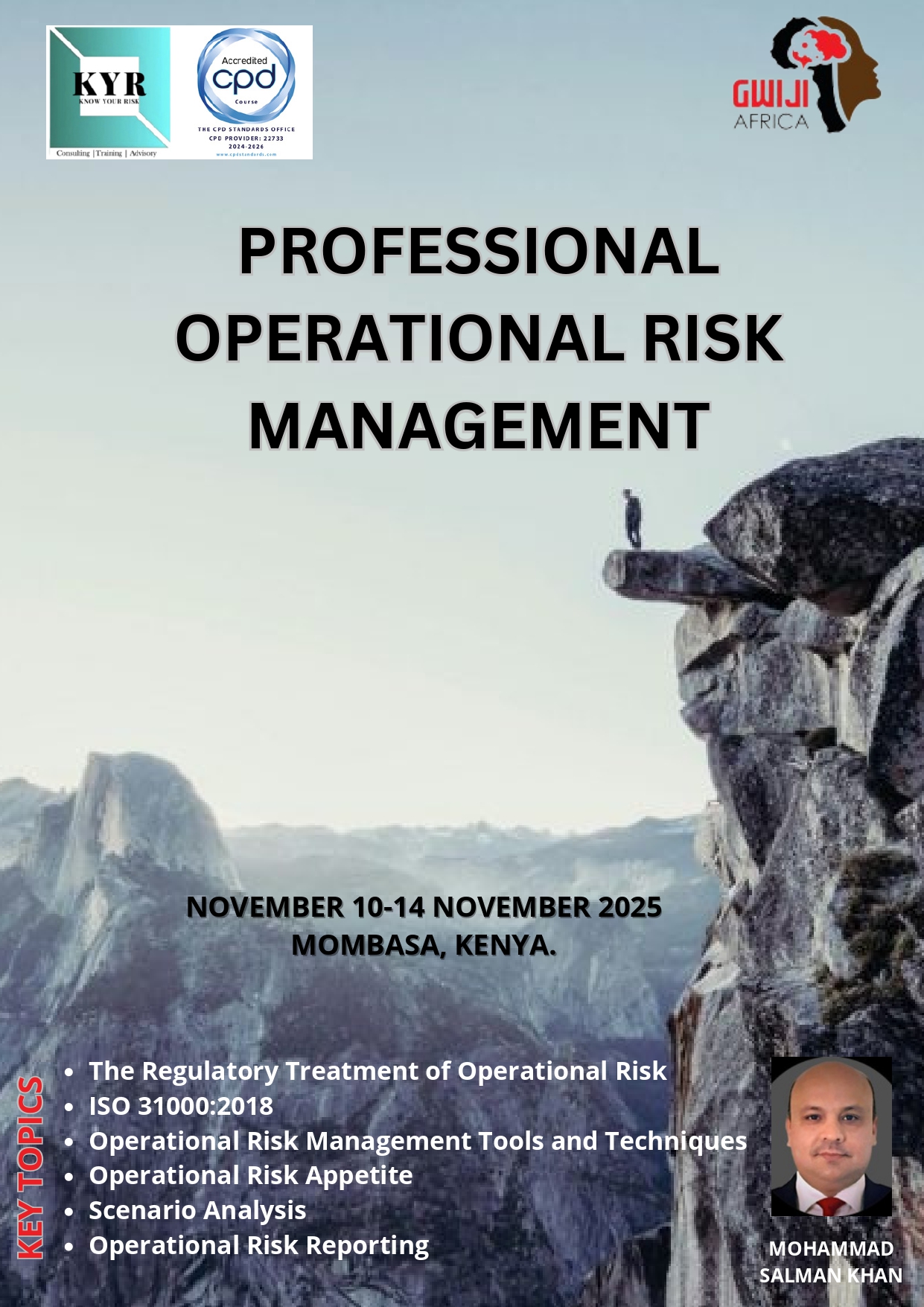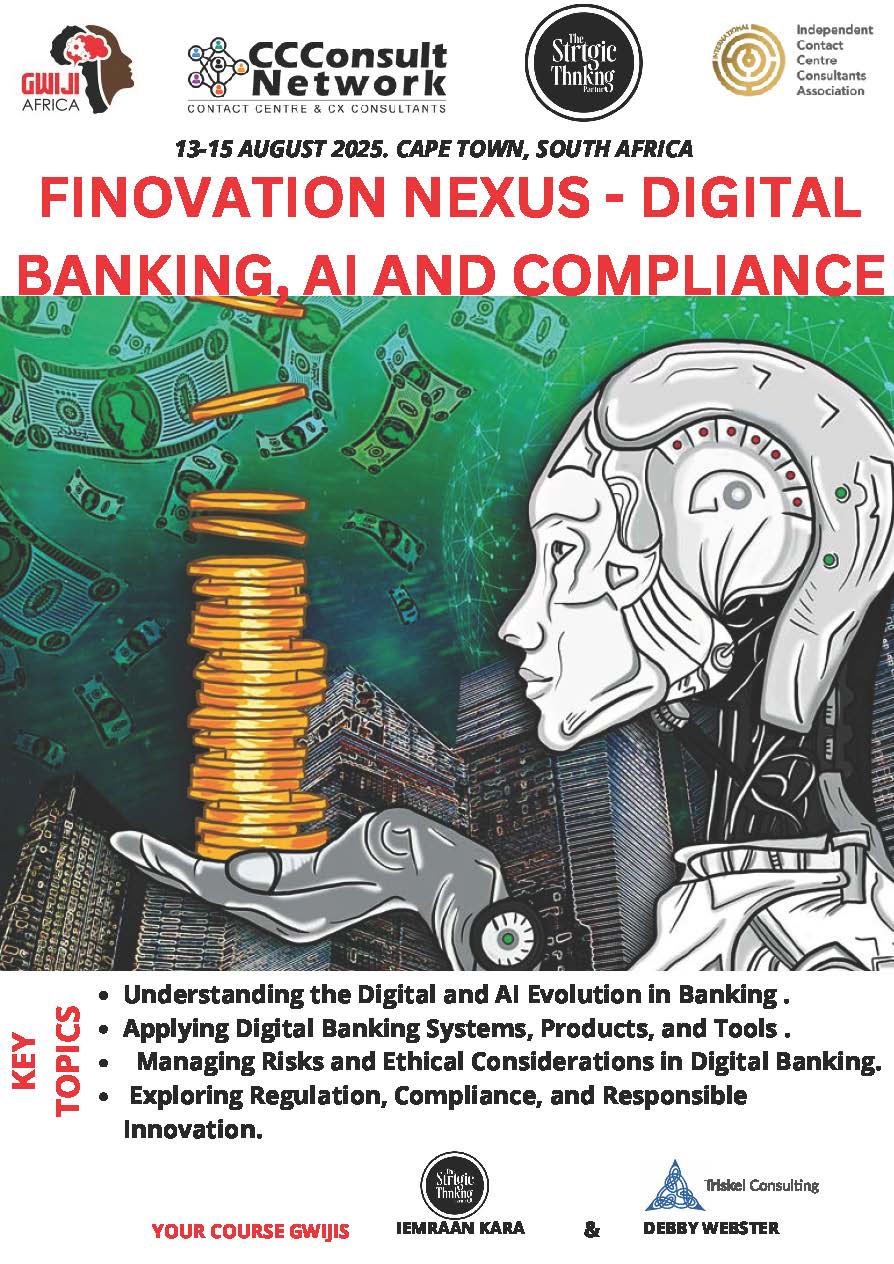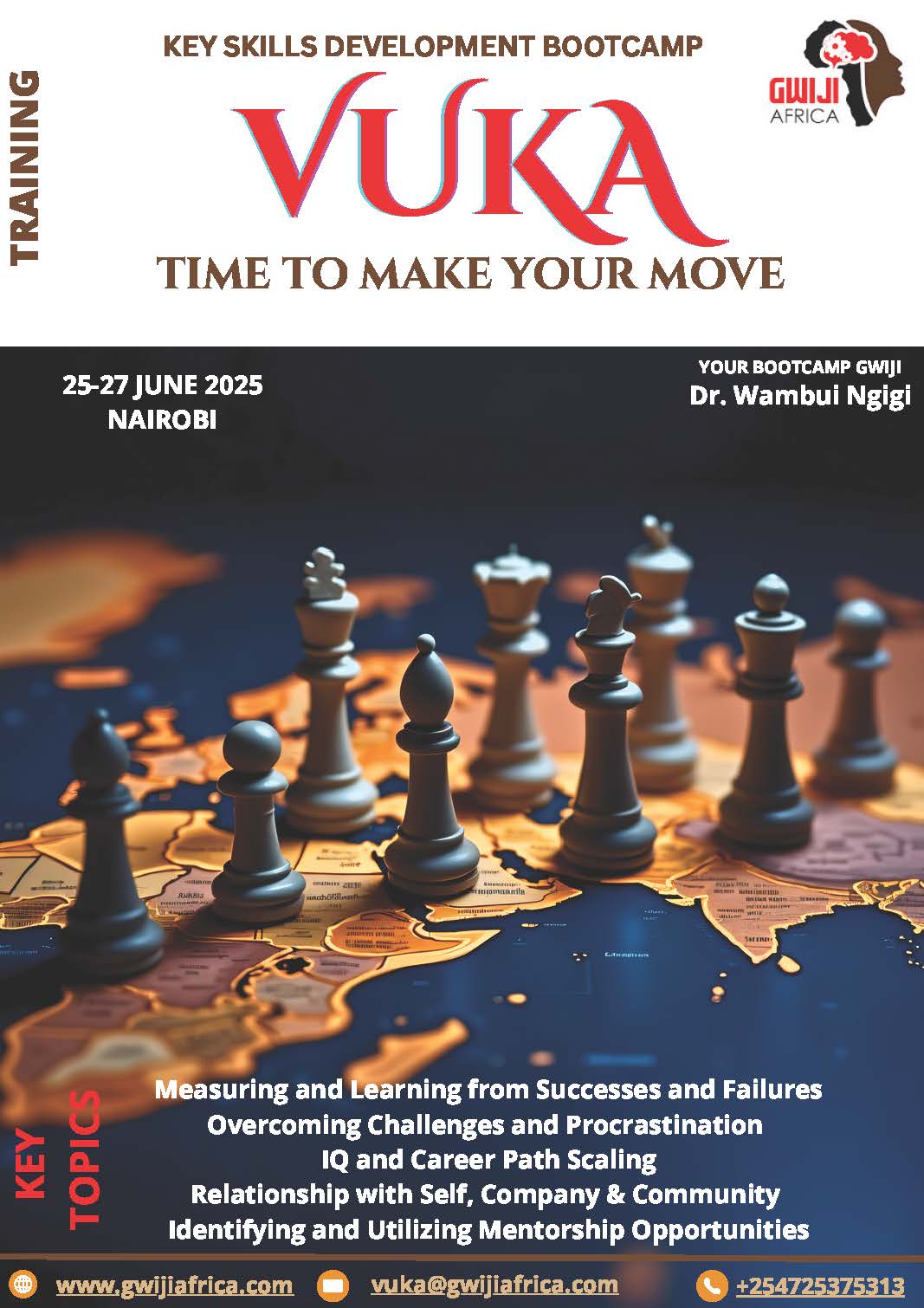
We Are Gwiji Africa
GWIJI – Swahili word used to describe someone who is an expert/ace/star of a certain specialization or art
ABOUT US
“Gwiji is a Swahili word used to describe someone who is an expert/ace/star of a certain specialization or art. At Gwiji Africa, our training courses and conferences aim at making the attendees experts in their fields. With well researched courses and carefully vetted independent trainers and facilitators, we guarantee world class course delivery and invaluable knowledge to competently implement and run your day-to-day job like the Gwiji you are.
WHY GWIJI?
With our wide variety of certified and non-certified courses covering soft and hard skills in an array of industries, you will be assured of: Well trained staff who in turn ensure a healthy bottom line. Cost effective. High ROI. Customized/ bespoke courses tailored to your organization’s fit”. Practical and applicable industry best practice skills.
Our Trainings and Courses
Credit Risk Machine Learning and Artificial Intelligence - 8th- 10th December 2025, Nairobi - Kenya
Price :$ 1,699
Course Director : Tiziano Bellini.

About the course director
Responsible of Prometeia Risk Integration and Advisory for International Markets, including Egypt since 2022. This area of expertise include:- Stress testing and Recovery Planning.
- Advisory on planning and enterprise risk management processes.
- Models & methodologies, development of simulation tools for integrated risk management
- IFRS 9, CECL, Loss forecasting, PD, LGD, EAD modelling.
Professor at the University of Bologna: Master in Quantitative Finance
Visiting professor at Imperial College in London, the London School of Economics and Political Science, , University of Passau in Germany.
A recognized expert at international level in Stress Testing and Recovery Planning, authoring multiple books on the topic:
- Stress Testing and Risk Integration in Banks, A Statistical Framework and Practical Software Guide (in Matlab and R), edited by Academic Press (2016)
- IFRS 9 and CECL Credit Risk Modelling and Validation: A Practical Guide with Examples Worked in R and SAS, edited by Academic Press (2019)
- Reverse Stress Testing in Banking, A Comprehensive, edited by De Gruyter (2021)
- Authored papers published in European Journal of Operational Research (EJOR), Computational Statistics and Data Analysis (CSDA) and other top reviewed Journals.
- Referees of Journal of Banking and Finance (Elsevier) and Journal of Applied Statistics (Taylor&Francis) and other top Journals.
- Trainer in risk management and statistics in Europe, UK, Asia, Middle East, Africa.
Course Overview
The course will provide attendees a comprehensive overview of Machine Learning techniques applied to credit risk modelling. A hands-on approach is followed by providing both the theoretical and practical toolkit to use on a day-by-day basis. The open-source statistical software R paves the way for grasping all details required to create customized analysis.
During the first day, the key instruments used for modelling are explored. A wide use of the software R characterizes the course from the very beginning. In day one, the emphasis is on familiarizing with Machine Learning techniques and R programming. Indeed, an extensive interaction with R paves the way for the whole program.
On day two, machine learning applications will mainly focus on Probability of Default estimation based on scorecard one-year modelling and linkage between scorecard and PD calibration. Attention is mainly on classification and regression trees, bagging, boosting, and random forest. Furthermore, a time horizon expansion to encompass the entire lifetime characterizes day two. Survival analysis is introduced and a combination of machine learning techniques is explored by means of R software.
In day three, both EAD and LGD are explored. Behavioural model encompassing prepayment, overpayment and a comprehensive EAD dynamic are studied through the lenses of bagging, boosting and random forest modelling. Similarly, LGD is explored by considering the techniques explored throughout the course.
Who should attend
- Risk managers: model developers and independent model validators.
- Auditors with focus on quantitative methods and applications.
- Finance professionals with focus on advanced modelling.
- Credit experts leveraging advanced techniques

BALANCE SHEET STRESS TESTING AND RECOVERY PLANNING - 3rd December - 5th December 2025

Course overview
Learning objectives
Who should attend
Meet our Course Director
Dr Tiziano Bellini, PhD (Statistics) Responsible of Prometeia Risk Integration and Advisory for International Markets, including Egypt since 2022. This area of expertise include:
Wide risk management experience across Europe, Africa and the Middle East. Before joining Prometeia, he was Director at BlackRock in London, Barclays Investment Bank in London, EY Advisory London, and HSBC Headquarters. Professor at the University of Bologna: Master in Quantitative Finance Visiting professor at Imperial College in London, the London School of Economics and Political Science, , University of Passau in Germany. A recognized expert at international level in Stress Testing and Recovery Planning, authoring multiple books on the topic:

CERTIFIED ENTERPRISE RISK MANAGEMENT PROFESSIONAL - 17th November - 21st November 2025

Synopsis
The World is changing fast and leaders need to prepare for trends that have the potential to significantly alter the risk landscape for their companies. This dynamic future is expected to bring opportunities for Organisations, while at the same time, it can also create considerable threats for those who are not well prepared. Moreover sustainability requires we outgrow our past where risk management was often an exercise in fear and avoidance where organizations focused primarily on completing necessary, compliancedriven activities. Today and in future, use of effective Risk Management shall potentially drive Performance and Value creation above traditional Value Protection Perspective. Certified Enterprise Risk Management Professional- program is given to professionals who are well-experienced in the field of Enterprise Risk Management and can demonstrate their knowledge, experiences, and skills in managing the ERM process, which consists though not exclusively setting the context, identifying, and assessing, mitigating, and monitoring risk
Why Risk Management
Consequent to above imperative, there is a growing recognition and implication that Risk Management has become a critical good governance success factor for all Organisations. Accordingly Leaders must build the capability to deal with risk well. This training shall help you establish and deepen technical expertise to orchestrate a sound Risk Management Practice in your organization. The Comprehensive course comprise skills needed to take the opportunity to manage your enterprise risk including taking calculated risk for forward-looking value adding choices as key ingredients to attainment of objectives and shall catalyze sustainable growth in the uncertain futures.
Learning objectives
This ISO 31000 Contextualized Certification training program provides end to end Enterprise Risk Management body of knowledge, understanding, skills and competencies including evolution of Risk management and understanding of current drivers of Enterprise Risk Management approaches.
Who should attend?
Organisations that will benefit: Government agencies, Infrastructure-Transport, Telecommunications, Retail and distribution, Health care and pharmaceutical companies, Energy, Financial Services-Banking, Micro-Finance, Insurance, Credit Unions, Humanitarian/Not for Profit, Hospitality and Public Sector Organisations. The Program designed to provide both holistic perspective and deepen technical skills for Managers, Executives, Professionals and practitioners in ERM or related field, such as Compliance, Audit, Fraud investigations, BCM, credit risk, market risk, operational risk executives including;
Delegates shall be equipped with skills in:

CERTIFIED OPERATIONAL RISK MANAGEMENT - 10th November - 14th November 2025

Overview
Operational risk has emerged as an important and integral component of risk management practice and is regarded as a significant risk that can be found in any process within any organisation.
The failure of people, processes and systems that represents Operational risk has been attributed to most of the risk management failures that have been witnessed by many global institutions.
While market and credit risk remain as the other key focal points of risk management, operational risk cannot be ignored at any cost given its significance in Risk Management. Therefore the topic of Operational Risk covered in this training program is designed to allow participants to gain a thorough understanding of the concept, role and application of Operational Risk and the benefits that best practice Operational risk brings to an organisation, if properly and effectively adopted.
The main building blocks of an Operational Risk frameworks, the techniques and tools of Operational risk and the value and associated challenges that Operational Risk brings to allow for a full understanding of the entire topic area
Learning objectives

FINOVATION NEXUS - DIGITAL BANKING, AI AND COMPLIANCE - 13th-15th August 2025, CapeTown - South Africa
Investment :$ 1,285

Rationale
Financial institutions must keep up with AI and digitalization to remain competitive, efficient, and secure in a rapidly evolving market. The rationale behind this includes:
- Enhanced Customer Experience
- AI-powered chatbots, personalized recommendations, and digital banking improve customer service.
- Faster transactions and seamless mobile banking increase convenience.
- Operational Efficiency & Cost Reduction
- AI automates manual tasks, reducing errors and operational costs.
- Digital processes minimise paperwork, improving speed and accuracy.
- Fraud Detection and Risk Management
- AI analyses patterns to detect and prevent fraudulent activities in real-time.
- Risk assessment models improve decision-making for loans and investments.
- Regulatory Compliance and Security
- Digital solutions help institutions comply with ever-evolving regulations.
- AI-driven cybersecurity protects against cyber threats and data breaches.
- Competitive Advantage and Market Adaptation
- AI and digitalisation help institutions stay relevant.
- Advanced analytics provide insights for better business strategies.
- Financial Inclusion and Accessibility
- AI-driven banking services reach unbanked and underbanked populations.
- Digital platforms offer financial services beyond physical branches.
- Data-Driven Decision Making
- AI processes large volumes of data to uncover trends and predict market shifts.
- Banks use analytics to personalise offers and optimise investments.
- Commercial Awareness – Understanding how AI and digital tools affect business performance and customer value.
- Cybersecurity Fundamentals – Recognising digital vulnerabilities and supporting safer service delivery.
- Data and Digital Literacy – Interpreting customer and operational data to support informed banking decisions.
- Leadership and Influencing – Advocating for responsible innovation and cross functional collaboration.
- Problem Solving – Addressing practical challenges in service design, compliance, and customer experience.
- Self-Directed Learning – Building adaptive thinking and continuous development mindsets in a fast-changing digital landscape.
- All bank employees regardless of their specialisation, who want to expand their knowledge and understanding of digital, AI, and automated banking.
- General banking staff from operations, customer service, sales, compliance, IT, or administrative roles who want to stay future-fit in an increasingly digital environment.
- Team leaders and supervisors looking to apply digital tools to improve customer service (CS), customer experience (CX), and operational efficiency.
- Early-career professionals and interns who are entering the workforce and require foundational digital banking and AI fluency to support innovation and adaptability.
- Afrillennials, as the gateway generation, and multi-generational talent seeking to strategically bridge generational shifts in technology adoption, customer preferences, and service delivery.

VUKA- KEY SKILLS DEVELOPMENT BOOTCAMP - 7th-11th July 2025, LIVE VIRTUAL TRAINING
Early Bird: USD 40 | MZN 2,600 (Early Bird Deadline 15th JUNE 2025)

This bootcamp is targeted at young entrepreneurs seeking self-development, and to understand the power of SELF, of POSITIVITY, of BELIEF. It's also suitable for recent graduates aiming for their first job as well as small organizations looking to onboard and induct new employees.
We will outline the basic but essential factors of Basic Self Management (EQ) and how to enhance Personal Vision & Personal Purpose.
Focus is on understanding the modern economy, its challenges; and enhancing and improving one’s mindset, attitudes, and understanding the bigger picture of today’s world. The objective is to inculcate :
- Active Citizenry - Societal Integrity, Morality, Trust, Openness and becoming a Contribution at the workplace and society in general.
- Creative thinking
- To recognise the value of diversity and its power to re-imagine the normal.

VUKA- KEY SKILLS DEVELOPMENT BOOTCAMP - 25th-27th June 2025, Nairobi, Kenya
Early Bird: Ksh. 5,999 (Deadline 30th May 2025)
M-PESA PAY BILL: 247 247
ACCOUNT NUMBER: 202507
ACCOUNT NAME : GWIJI AFRICA TRAINING & EVENTS LTD.
AMOUNT COVERS PRINTED TRAINING MATERIAL & LUNCH

This bootcamp is targeted at young entrepreneurs seeking self-development, and to understand the power of SELF, of POSITIVITY, of BELIEF. It's also suitable for recent graduates aiming for their first job as well as small organizations looking to onboard and induct new employees.
We will outline the basic but essential factors of Basic Self Management (EQ) and how to enhance Personal Vision & Personal Purpose.
Focus is on understanding the modern economy, its challenges; and enhancing and improving one’s mindset, attitudes, and understanding the bigger picture of today’s world. The objective is to inculcate :
- Active Citizenry - Societal Integrity, Morality, Trust, Openness and becoming a Contribution at the workplace and society in general.
- Creative thinking
- To recognise the value of diversity and its power to re-imagine the normal.

SUSTAINABILITY ESG: PRINCIPLES AND APPLICATION FOR IMPACT - 29th-31st July 2024, Nairobi, Kenya
This course provides an overview of the role and responsibilities of the board and directors in promoting sustainability management, compliance, and strategies within a company. The potential impact and implications of environmental, social and governance (ESG) developments, climate related risks and opportunities for companies, and how companies can drive value creation through ESG will be explored and discussed during the course.
OBJECTIVES OF COURSE The programme will allow participants to:
- Gain understanding of sustainability, ESG, concepts and frameworks.
- Acquire knowledge on global and local sustainability trends and tools.
- Understand the importance and reason for using sustainable business concepts.
- Identify and list the benefits of Sustainability ESG for an organisation.
- Acquire an understanding of how successful sustainability ideas and reporting look like in an organisation.
- Recognise and take actionable steps at an individual level to realise sustainable ideas.
- Gain understanding of why Sustainability ESG reporting is used to measure sustainability.
- Gain knowledge of a basic Sustainability ESG assessment and how to complete it.

LOCAL CONTENT DEVELOPMENT & MANAGEMENT - 3rd-5th July 2024, Maputo | 8th-10th July 2024, CapeTown
The SECOND day will be to fully elaborate on the fundamental opportunities that different sectors provide within a local content agenda. These opportunities will be strategically outlined with levels of priority and importance so that participants can have a rounded knowledge of where best their strengths lie and how they can tap into these opportunities. The second half of the second day then highlights in phases the different steps that the participants should take to fully capitalize on these opportunities. This will also be a highly interactive session with a discussion format.
On the THIRD and final day, there is a focus on exposing participants to a more external dimension of local content especially in a globally connected world. This showcases the opportunities for local suppliers and participants to strategize in internationalizing their capacities tapping into a wide range of resources now available to them. At the end of the day, the biggest measure of a true local content value is international competitiveness and this would be explored on the third day.

Liquified Natural Gas (LNG) Trade Dynamics and Risks - 1st-5th July 2024, Online
This course provides a comprehensive understanding of the LNG trade dynamics, and essential features of its logistics, pricing, and associated risks. It highlights the significance of LNG for ensuring energy security. The course will emphasize the role of LNG within the global energy mix and strategy and will provide insights into LNG trade including logistics and pricing.
The course will cover in detail:
- LNG Value Chain
- LNG Shipping and Custody Transfer
- Global LNG Trade
- LNG Financial Derivatives and Projects Economics
- Risk Management
- Achieve a complete overview of LNG value chain elements
- Understand the role LNG plays in future energy security and how LNG trade is revolutionizing the gas industry
- Comprehend the technology and developments
- Recognize the environmental advantages of LNG as an alternative fuel
- Determine the key points influencing global LNG trade

Strategic Planning & Organizational Development - 29th-31st July 2024, Nairobi, Kenya
- Strategic Planning in an Agile transforming world
- Shifting strategy from ideas to Operational Implementation
- Organizational Culture Analysis and interventions
- Transformational Adaptive Growth
- Talent Management, development and Succession Planning strategies – Purpose versus Plan
- Improve their organization's overall effectiveness.
- Set a vision for the future
- Give their teams a sense of direction
- Gain a competitive advantage
- Innovate
- Become more proactive
- Increase productivity and efficiency
- Increase sales and profits
- Keep their employees motivated

Mastering Communication Skills for Effective Collections - 25th&26th MARCH 2024 NAIROBI,KENYA
In many countries, English is seen as the preferred business language, and is the most dominant language in the business world. However it is often not a first language and attention needs to be given to ensure that staff are able to communicate effectively and correctly with customers.
Purpose The purpose of this programme is to assist the attendees in understanding the reason for exemplary customer care practices and providing attendees with the ability to be the best in every contact with the customer and to enable attendees to increase the collection of outstanding revenue using their communication skills.
Who Should Attend This training programme is aimed at staff members who are involved in communicating with Customers (Internal and External) in business English to ensure an exceptionally high level of service.

TALENT MANAGEMENT TO ACHIEVE A HIGH-PERFOMANCE CULTURE - 21st-22nd MARCH 2024 NAIROBI,KENYA
LEARNING OUTCOMES:
Following this course, you will be able to:
B. Develop and promote leadership competencies that will frame the behaviors expected for organizational success.
C. Pinpoint the components of the performance management system to maximize people’s potential and performance.
D. Assess an organization’s bench strength and learn how to design and facilitate the succession planning process.
E. Identify when and how to use assessment tools for both talent selection, talent development and team formation purposes.
F. Orchestrate a 360-degree feedback process and deliver positive and constructive feedback to ultimate improve individual and team performance.

Certificate in GREEN PROCUREMENT PRACTICES - CGPP™ - 18th-21st MARCH 2024 NAIROBI,KENYA
Watch preview of training here
This course is especially designed for you to actively champion the ecofriendly and sustainability cause for your organization. The aim of this course is to provide practical guidance in Greening your Supply Chain based on what is being done in Fortune 100 companies, recognized world-wide for their environmental initiatives and financial savings. This hands on course is a blend of best practices, case studies, tools and methods based on those utilized by the Fortune companies to allow for a doable, straight-forward-Green Supply Chain with a specific focus on Procurement. The CGPP™ course consists of eleven key modules which include presentations, demonstrations, discussions and exercises led by Patrick Woods (Bio and profile in brochure).
BENEFITS OF ATTENDING.
-Create a Strategic Supply Plan and an Operations Plan to implement it
-Understand both the benefits of a Green Supply Chain with a focus on Procurement and the costs of lacking a focus
-Deploy a four-step process to decision making
-Engage a ten-step approach to Green Procurement
-Identify Green focus areas then implement key strategies and practices
-Understand both ISO14000 and ISO20400 and how they compliment Green
-Take this program from concept to reality – conclude with a doable Procurement action plan
-Be equipped with the knowledge and skills to implement sustainable Procurement practices that align with ISO20400 standards.
-Learn how to assess supply chain sustainability
-Develop and implement Green Procurement Strategies
-Measure and report on sustainability performances
-Implement best practices and emerging trends in Green Procurement Initiatives

Quality Assessing and Calibration

CUSTOMER RETENTION & COLLABORATION

FATIGUE & BURNOUT STRESS SYNDROME MANAGEMENT

STRATEGIC HR BUSINESS PARTNER CERTIFICATION PROGRAM

Sustainability via Process Safety Management including Emotional Intelligence

Advanced Failure Modes Effects Analysis

NEBOSH IOGC

ANTI MONEY LAUNDERING

INTERNAL AUDIT , COMPLIANCE AND ERM TRIANGLE

CRISIS MANAGEMENT

Contact us
+254 725 375 313 | +254 750 800 230 | +254 779 740 005 | info@gwijiafrica.com
Gwiji Africa Training and Events LTD | Kuba Villas, office door 4, Forest line road | P.O Box 163-00208|Ngong Hills, Kenya.










